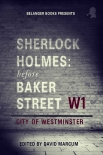Sherlock Holmes: Before Baker Street David Marcum (reading eggs books .TXT) 📖

- Author: David Marcum
Book online «Sherlock Holmes: Before Baker Street David Marcum (reading eggs books .TXT) 📖». Author David Marcum
Given Sherlock Holmes’s frequent lapses into moody taciturnity, and his generally eccentric and unpredictable habits of conversation, I have had to depend upon other sources in order to obtain a reasonably self-contained record of the affair. I am indebted, in particular, to one of Holmes’s fellow-students from his University days whom Holmes has referred to, from time to time, in scattered recollections of his youth: This person was involved in, and indeed became a beneficiary of, the circumstances surrounding the event. I refer to the Reverend Samuel Cranshaw, whom I tracked down to the Parsonage of St. Peter’s Church in the pretty little hill-station of Kodaikanal, nestled in the Western Ghats of Madras Province in Southern India. He has obliged me with a detailed account of the case, written in response to my request, some years after the event.
What follows is Cranshaw’s lengthy appendix to his letter to me, which arrived a fortnight ago, post-marked 19th July, 1919. I may add that I have since shared it with Mr. Sherlock Holmes, who has offered his grudging approval of the record, in these words, conveyed to me in a post-card dispatched from his secluded retreat in the Sussex Downs:
“I suppose I should be grateful to both you and Cranshaw for bringing this early case of mine to public light, though it goes without saying that neither Boswell has displayed the slightest compunction over betraying his Johnson for the more earthy appeal of the sensational and the romantic.”
The Reverend Samuel Cranshaw’s Statement
For five years now, I have been the Pastor in charge of St. Peter’s, a beautiful little church built on the extreme edge of a cliff in the small hill-town of Kodaikanal, located at an elevation of about seven-thousand feet, in that part of the mountain range known as the Western Ghats, which traverses South-Eastern India. I am attached to one of the many Missions of the Church of England, and I cater to a small congregation, comprised mainly of our own people who came to India in order to assist with the civil administration of the Empire’s most prized colony, and decided to stay on at the conclusion of their careers. There are also a few native Christian members of the Church, and we endeavour, as a community, and after our modest fashion, to spread the faith among the inhabitants of the neighbouring villages, and to help with their educational and health needs.
Rambling through Kodaikanal, one encounters quaint little cottages, (occupied by missionaries or civil service pensioners,) with names such as “Sunnyvale” and “Claverack” and “Bide-a-Wee”, all reminders of home. I often sit of an evening on the stone bench of the Parsonage, which yields a spectacular view of the valley beneath, including the spire of the Sacred Heart Chapel built by the Jesuits in the village of Shembagannur, or I contemplate, on the horizon, the noble brow of Mount Perumal which, when it is covered by clouds, furnishes an unfailing forecast of rain in Kodaikanal. In these vistas of valleys and forests and hills and clouds, it is very easy to lose oneself in fond recollections of home.
The sense of home was brought even closer to me last week with the arrival of a letter from England, written by Dr. John H. Watson, who has done so much to bring to the world’s attention the exploits of its foremost consulting detective (now retired) – Mr. Sherlock Holmes of Baker Street. Dr. Watson has somehow unearthed the fact that I was a fellow-student of Sherlock Holmes in our University days, and he would like me to furnish an account of an early case, which he refers to as “the singular affair of the aluminium crutch”, and which occurred in the precincts of the College, when Holmes and I were students together. I am glad for this opportunity to recollect the past, and to shed some light on an early phase of Sherlock Holmes’s remarkable career of detection. I must, however, hasten to declare: ‘caveat lector’, for I have no literary pretensions, and I must beg the reader of this piece to put up with my many deficiencies as a writer.
In the days of my undergraduate career, a majority of students graduating from the Varsity ended up in the clergy, or in the diplomatic services, or as educated members of the landed gentry, living off their rents or their inherited wealth. I myself was a student of very limited means, destined for the cloth, and subsisting on scholarships which threatened to run out in the course of my third year of training in Theology. These were hard and uncertain times to live through, and particularly difficult to countenance when one lives in the midst of aristocrats and noblemen who had neither the practical knowledge nor the moral imagination to empathize with the fate of poorer students such as myself. One largely suffered in silence, while hoping for the best. One of only two fellow-students in whom I confided my anxieties was a chap called Sherlock Holmes.
This Holmes was,





Comments (0)